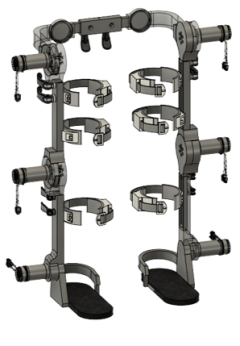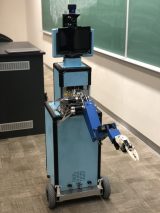
Project’s Foundation
The Intelligent Telepresence Assistive Devices (iTAD) project is a multi-disciplinary capstone project which brings together talent from the Carleton University Mechanical and Aerospace Engineering (MAAE) Department. The iTAD Capstone Project was originally launched in 2016, with the idea to develop a medical robot for use in hospital environments. Since then, the project has switched focus, and is geared towards developing robots for assistive mobility purposes. Currently, the iTAD team consists of 16 fourth-year engineering students from a variety of disciplines at Carleton.

EAWa Lite 1.0 Initial Design
Current Focus
In 2022, it was decided that a break was needed from the development of a medical robot, and the idea of creating a wearable exoskeleton to assist in walking was developed by the project’s Lead Engineer, Mojtaba Ahmadi. The capstone project team for the 2022-2023 academic year began working on developing a prototype for the Exoskeletal assistive Walking device (EaWa) and the EaWa Lite, which will use the help of a body weight support system, to aid people with mobility issues.
iTAD has now become a multi-project capstone, where the main focus is to develop assistive medical devices that can aid doctors, nurses and people with mobility issues.

iTAD 3.0
iTAD’s History
For the first year of iTAD (2016-2017 academic year), research was conducted to determine the specific requirements for the robot and an early proof of concept was developed. Over the 2017-2018 academic year, the first functional prototype was developed using high-quality components making iTAD ready for clinical testing in different applications. In the 2018-2019 academic year, the focus was on optimizing iTAD for use in hospital environments.

VARS Prototype
VARS HISTORY
In the 2019-2020 academic year the Versatile Assistive Roaming System (VARS) was introduced to the iTAD project scope. The intent of VARS was to provide a powered mobility system to enable more mobility for people with balance impairment.
